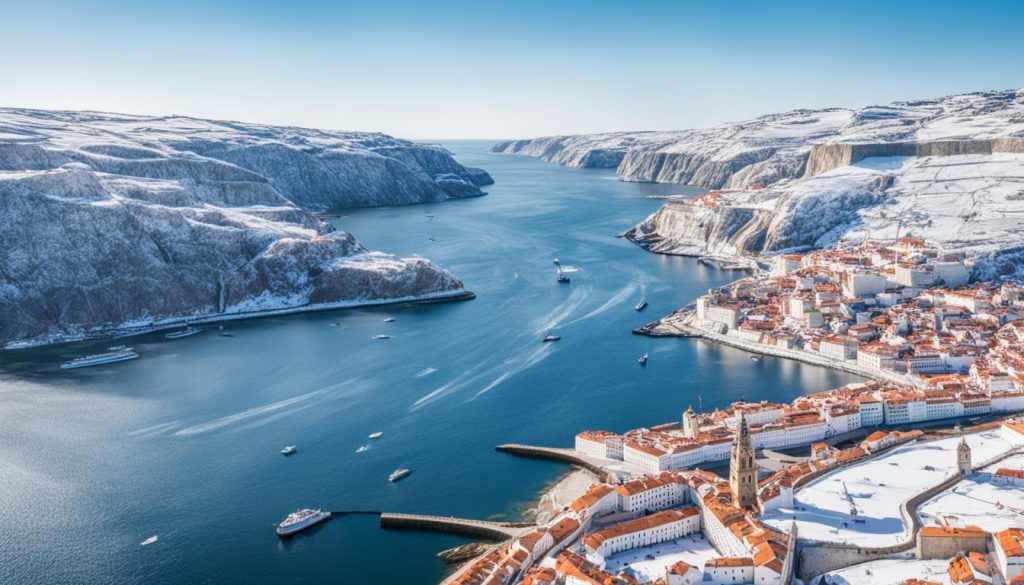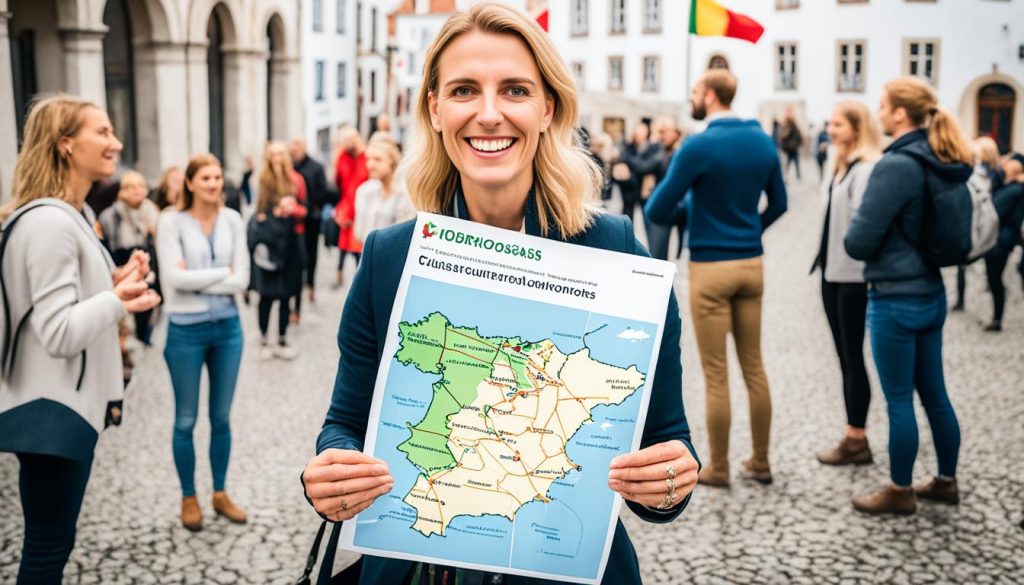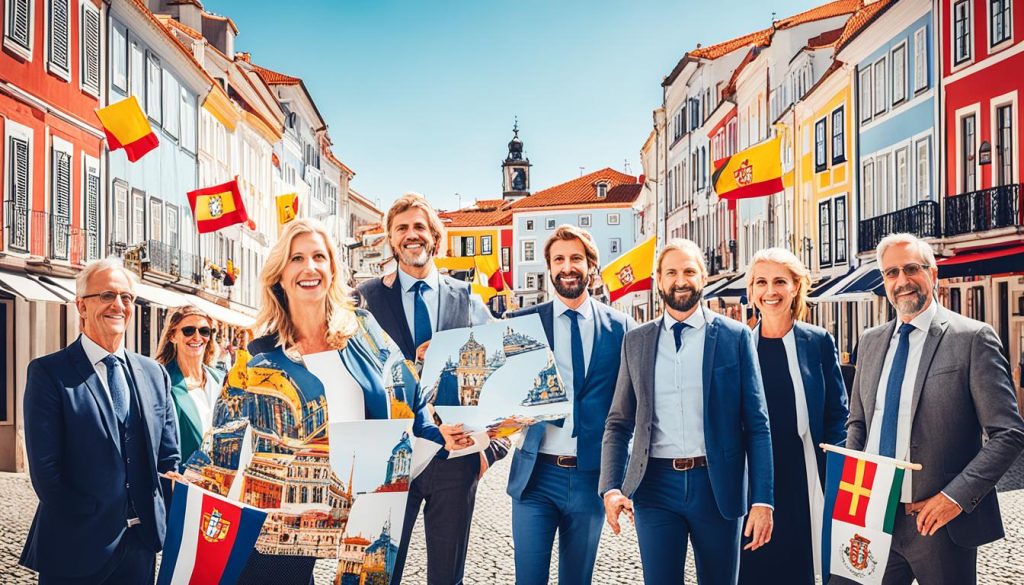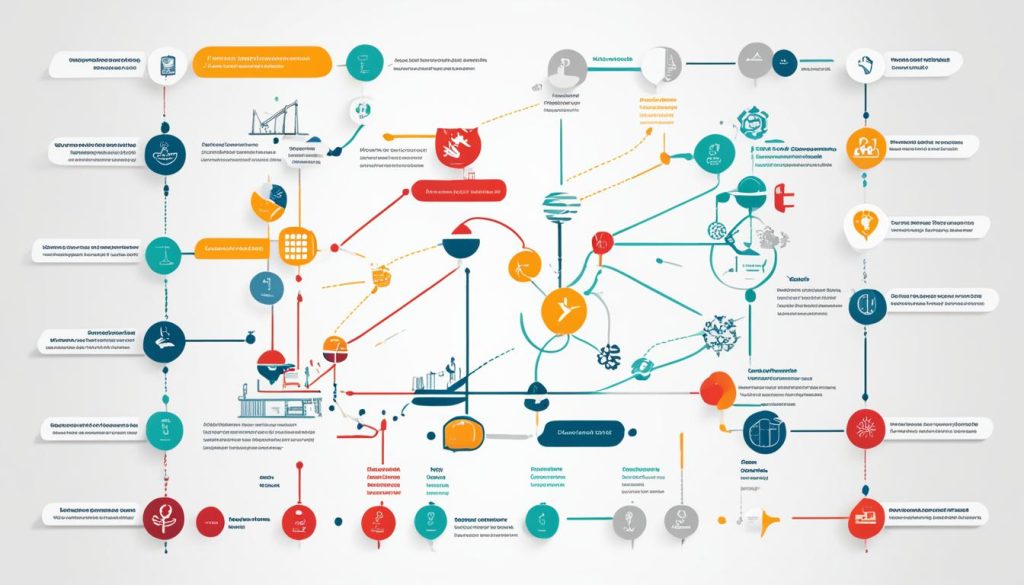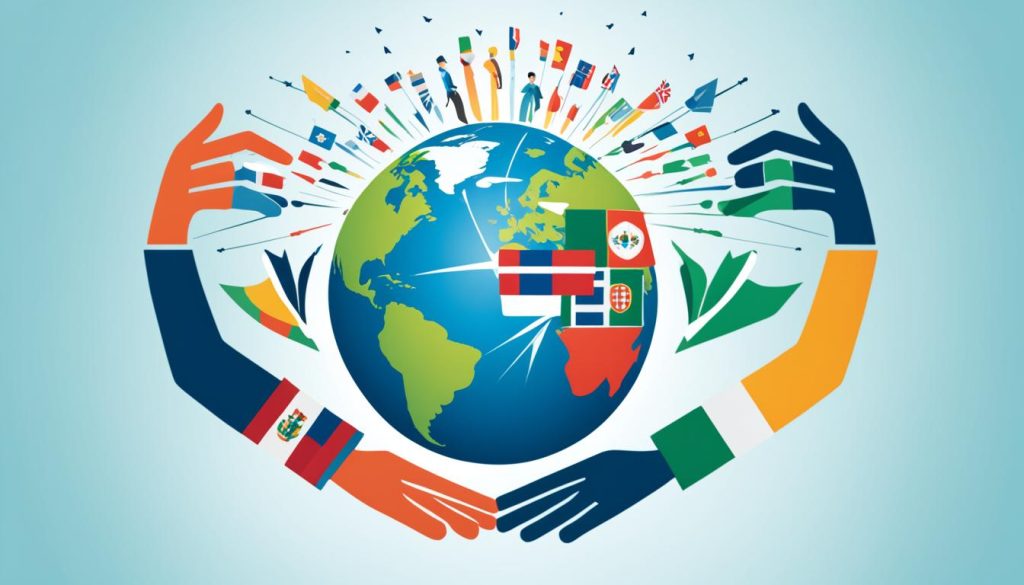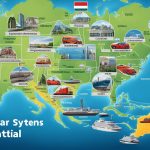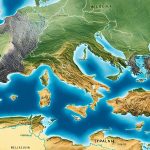It’s crucial to grasp the cultural differences for international business success. The Scandinavian business culture in the Nordic countries highlights teamwork and efficiency. This affects the way companies function there. Similarly, understanding Portugal’s business practices is key for good business ties with this unique Mediterranean country. Comparing these cultures shows how national character influences business dealings.
Understanding Cultural Nuances in Business Strategies
In today’s world, knowing about cultural awareness is key in business strategies. The difference between Sweden and Norway’s business cultures shows the depth of international cooperation. Norway values national pride and teamwork. In contrast, Sweden focuses on global business success. So, understanding these cultural nuances is vital.
Swedish companies think globally in their strategies. They use a wide approach and consider many viewpoints before making decisions. This shows their strong global business mindset. In contrast, Norway makes decisions quickly and locally.
Norway’s businesses act fast and prioritize national and local values. They are known for their quick decisions and strong community loyalty. Their business success is tied to valuing national culture.
The mix of Nordic business teams uses cultural strengths well:
- Danes bring persuasive skills in sales.
- Swedes excel in planning and managing projects.
- Norwegians tackle crises with creativity.
This shows a smart way to use each culture’s special skills. It makes Nordic teams work well together.
Understanding and respecting these cultural differences helps international cooperation. It brings respect and success in global business. Knowing how to handle these cultural and operational differences leads to smooth and successful international projects.
Climatic Influence on Work-life and Culture
Moving from Nordic winters to Mediterranean life brings big changes. Especially in how the weather affects our daily activities. A key difference is seen in work-life balance. This idea is important in Nordic countries but changes in the sunny Mediterranean. Adjusting to these climates means individuals and businesses must learn to adapt culturally when moving between these areas.
The Impact of Climate on Business Operations
In the Mediterranean, businesses adapt to the slow-paced summers. This is different from the quick pace in the Nordic regions during their short, bright months. Adapting involves changing work schedules, looking after employee health, and redesigning workplaces for the heat. These changes are crucial. They reflect the regional attitudes towards work and balancing life outside of work.
Adapting to Seasonal Changes in Lifestyle and Work
How we mix work and fun changes with the seasons in Nordic and Mediterranean places. Dark Nordic winters make people focus on indoor activities and work. But the sunny Mediterranean weather means living outdoors and a relaxed pace. Changing from Nordic to Mediterranean life means not just enjoying warmer winters. It also means letting these weather patterns shape our daily lives and work habits.
Navigating Social Interactions: From Nordic Reservedness to Portuguese Openness
The social interactions in Portugal are quite different from those in Nordic countries. While Nordic cultures value privacy, the Portuguese openness encourages being sociable and welcoming. This extends to work as well. Newcomers from the north find the easy way of starting chats with strangers in Portugal refreshing. Yet, they might also find it a bit hard at first.
- Switching from a Nordic to a Mediterranean social setting means moving from formality to casualness in greetings and talks.
- In Portugal, it’s normal to hug or kiss on the cheek, which those from Nordic countries might need to get used to.
- Building strong local friendships is key to fully enjoying the lively Portuguese lifestyle.
It’s vital for professionals and expats to grasp this change when moving to Portugal. Recognising it helps in blending into the culture smoothly. It also leads to personal growth and wider social circles. By getting involved in cultural adaptation, you get a richer experience abroad. It helps you make lasting bonds and understand the importance of diversity in the global community.
The Role of Tradition in Portuguese and Nordic Business Etiquette
Learning about business etiquette is crucial in international corporate interactions. The business practices in Portugal and Scandinavia are rooted in history. They show the importance of job titles and corporate hierarchy.
Each culture has its way of managing corporate interactions. Scandinavia, especially Sweden and Denmark, prefers less rigid hierarchies. This creates an equal workspace where individuals’ contributions are valued more than titles.
Importance of Hierarchies and Titles in Corporate Cultures
In Portugal, there’s a clear sense of formality compared to the Nordic approach. The respect for hierarchy and job titles shows the deep value of tradition. This guides both relationships and decisions at work. It also defines how business is conducted, setting Portuguese firms apart from Nordic ones.
Business Socialising: From Introductions to Mealtime Discussions
The way of socialising in business shows big differences between Portugal and Nordic countries. In Portugal, relationships are built over lengthy meals. This kind of mealtime etiquette builds strong business connections.
- Leisurely lunches in Portugal help in networking, unlike the more formal meetings in Nordic cultures.
- Swedish or Finnish professionals might find Portugal’s long business meals quite different from their usual meetings.
- In the Nordic areas, networking often happens more efficiently, with digital communication taking the place of face-to-face meetings.
Understanding these cultural contrasts is essential for international market success. It helps set the right expectations and improves cross-cultural negotiations.
Workplace Dynamics: Efficiency versus Flexibility
In today’s business world, a struggle exists between workplace dynamics and business efficiency. This is seen when compared to employment flexibility and corporate cultures. Especially, this is true when you look at Portugal and the Nordic countries. Their work attitudes really show how different cultures balance work and life.
Portugal is known for its friendly work environment. It usually has longer working hours and a relaxed view on time. This attitude, although focused on finishing tasks, suggests a more flexible work-life balance. This could challenge the usual strict business efficiency.
- Denmark shows employment flexibility through its dynamic job market. People there switch roles and companies quite easily, showing a cultural ease with change.
- Sweden, though, is seen as stable with well-managed employment practices. It prefers structured corporate cultures and predictable work cycles.
Bringing these cultural habits together has big effects on businesses, both locally and internationally. It encourages firms to adjust or even change their workplace dynamics. This helps them match better with local expectations and norms.
Denmark’s labour market is a perfect example of embracing cultural integration. Jobs there are associated with a readiness for change, such as in job transitions. This is very different from Sweden’s approach, which favours stable employment and carefully planned business processes.
- It is essential to understand these different dynamics to build efficient and collaborative international work relations.
- Things like labour laws and company structures might also need to change. This will help them better reflect the local work culture.
The difference between Portugal’s flexible work environment and the Nordic region’s efficiency highlights Europe’s diverse work dynamics. As companies grow and adapt to these cultures, finding a balance between efficiency, flexibility, and employee satisfaction is key.
Exploring the Variances in Decision Making Processes
The ways we make decisions in business show how deep culture runs in a company. Looking into how Nordic and Portuguese firms decide things shows their very different cultural values. Sweden focuses on everyone agreeing through detailed discussions before making a choice. This need for consensus is very different from Norway, which prefers individual autonomy. Norway’s way allows for quick, spontaneous decisions, avoiding long talks.
Denmark’s approach mixes these methods by being quick but still valuing everyone’s input. As business processes keep changing, knowing these cultural influences is key. They help in making deals, planning, and managing activities in these diverse European areas.
- Sweden’s collectivist decision-making aligning with longer, consensus-seeking processes.
- Norway’s individualistic style that values quick and decisive action over group deliberation.
- Denmark’s pragmatic approach facilitating adaptability and efficiency in decision-making.
These differences in decision-making highlight the unique cultures of each country. They show why understanding culture is vital in international business. By recognising these differences, companies can adapt their tactics. This helps them stand out in a global, culturally diverse market.
Comparative Analysis of Workforce Mobility and Job Security
The labour market in Europe is quite varied, with each country showing unique patterns of workforce mobility and job security. We see a clear distinction when comparing the Nordics to Portugal. In Sweden, large companies fuel a robust economy. Yet, rigid job structures push some to look for work in Denmark. This shift is often driven by the desire for better wages and job opportunities.
Denmark’s job market offers a high level of employment flexibility. This is something that Sweden’s strict employment rules lack. The Danish system eases the transition between jobs. It shows a comfort with the ever-changing labour market dynamics not seen in Sweden.
Portugal, on the other hand, has a workforce that values loyalty to their jobs. This could be influenced by different cultural views on job security. As a result, the job mobility seen in Denmark isn’t common in Portugal. Here, stability is often preferred to the uncertainty of changing jobs often.
When looking into why these countries differ, we might consider:
- Economic indicators like GDP and unemployment rates
- How people view work-life balance and taking risks
- The laws around ending jobs and contracts
- The impact of social safety nets on keeping staff
This comparison shows the varied nature of Europe’s labour markets. Each one is shaped by its own culture, economy, and laws. Denmark has a flexible labour force, while Sweden values job security, leading to less movement. Portugal follows its own path, blending job models with cultural attitudes towards work.
Organisational Structure: Consensus and Autonomy in Practice
The organisational structure within businesses deeply affects how they work and the culture they create. When we look at companies in the Nordic countries versus those in Portugal, we see different ways of using consensus decision-making and corporate autonomy.
In Sweden, work culture is shaped by strict and reliable methods. This structure and predictability come from their liking for making decisions together. This teamwork is a key part of their inclusive culture at work.
- Meticulous and organised operations
- A tendency towards consensus decision-making
- Workplace culture that values inclusivity and collective input
In Denmark, however, work culture promotes corporate autonomy. They prefer a direct way to handle tasks and solve business issues. Quick and practical solutions are valued more than long discussions here.
- Direct approach to task resolution
- Greater emphasis on individual decision-making autonomy
- Practicality over process in organisational structure
In the Nordic business world, we’re seeing a move away from traditional roles that decide everything. Instead, there’s a trend towards a more equal way of organising. This is different from old corporate systems where people’s roles strictly define decisions and culture at work.
This look into organisational structures in Europe shows the complex relationship between autonomy and consensus. It highlights how businesses balance these to make decisions, work together and succeed globally.
Embracing the Cultural Shift in Communication Styles
Being successful in today’s business world means adapting to different ways of communicating. There’s a cultural shift towards global communication in companies. This asks us to appreciate and understand different approaches. Especially when moving from Nordic to Portuguese business settings, the change is clear.
In Portugal, people value long, relational talks and ongoing social interactions in business. This is different from the more direct and brief chats common in Nordic countries. Welcoming and using these different ways of talking can help in adjusting to new cultures and working together successfully.
- Portuguese communication focuses on building personal relationships over time. It mirrors a culture that likes in-depth, friendly conversations.
- On the other hand, Nordic countries prefer to be straightforward. They value clear, short information and getting to the point quickly.
- For instance, Danes are known for being direct. They ask clear questions and give honest feedback. This might surprise people from Sweden, where people tend to avoid conflict and favour indirect communication.
Understanding this key cultural change is crucial. In the global market, being flexible with how we communicate can lead to success. It opens doors to new ideas, cooperative projects, and, in the end, business victories.
Cuisine: A Reflection of Environment and Heritage
Exploring food, we see nations’ flavours and recipes echo their environments and cultures. Portuguese cuisine shares stories of the sea and land, tied to the Mediterranean diet’s traditions. Nordic food, on the other hand, is about simple tastes and smart preserving methods, due to historical challenges.
The Contrast Between Portuguese Richness and Nordic Simplicity in Food
Portuguese food is colourful and varied, with a deep bond to the sea. Dishes offer seafood tales linked to the Atlantic and its cultural heritage. The love for rich stews, olive oil, and wines reflects the Mediterranean diet’s core. In contrast, Nordic food values simplicity and innovation. The need to survive cold winters led to smoking, pickling, and fermenting, creating simple yet hearty flavours.
Coffee Cultures: A Bridge Between Diverse Palates
Coffee culture links Nordic and Portuguese cuisines in unexpected ways. Both cherish their coffee traditions, despite their culinary differences. The Nordics turn coffee drinking into a near-sacred rite, a defense against the cold or a companion to summer nights. In Portugal, espresso marks meal endings and is pivotal in daily life. These coffee habits highlight a common love across culinary borders.
The Significance of Language in Cross-Cultural Integration
When we travel across borders, the importance of language in blending cultures is clear. Learning to overcome language barriers is crucial for easy integration and understanding in new cultural settings. The Portuguese language, known for its beauty, contrasts with the unique sounds and rules of Nordic languages.
Learning the local language shows respect and helps in overcoming challenges in new cultures. It opens doors, whether for career goals or for engaging with local communities. Tackling the learning curve of Portuguese or a Nordic language connects us deeper with people and their traditions.
- Being fluent in a language reveals deeper social and work opportunities that language barriers hide.
- Knowing slang, cultural hints, and manners in a language builds stronger friendships.
- Understanding everyday speech helps in catching the fine points of cross-cultural talks, preventing misunderstandings.
So, learning to break down these language walls is not just helpful; it’s necessary for anyone entering the mixed landscape of Portuguese and Nordic cultures. Putting in this effort greatly improves the experience abroad. It turns cultural differences into chances for learning and self-discovery.
Employee Benefits and Parental Leave Policies: A Comparative Overview
It’s vital for companies in different welfare systems to get the details on employee benefits and parental leave right. When looking at the Nordic countries versus Portugal, the differences in employment policies show what each place values. Each area creates rules that aim to look after workers’ well-being.
In places like Sweden and Denmark, people are really happy with their jobs. This is because these countries offer great parental leave within their big welfare systems. Their way shows they believe in balancing work and family life. They don’t think looking after children is just up to the parents but a shared duty.
- Sweden’s parental leave policies allow up to 480 days of paid leave, which can be shared between parents to foster gender equality and promote paternal involvement in early childcare.
- Denmark’s approach also endorses prolonged leave, offering a combination of paid maternal, paternal, and parental leave options that facilitate an employee’s return to the workforce without sacrificing family commitments.
Portugal, while differently, still cares about work-life balance and employee perks. Their parental leave might not be as long as in the Nordic countries. Yet, it still offers key support for new parents, keeping in step with EU rules.
- Understanding Portugal and the EU’s laws helps companies find agreements that work everywhere.
- Looking at what’s normal in Portuguese companies can show how benefits vary beyond what’s legally required.
This comparison of policies reveals how complex employee welfare is in Europe. Employee benefits and rules are a big, intricate picture. They need to be understood deeply, respecting cultural and legal differences.
Promoting Teamwork: The Nordic Collaborative Advantage
In the world of international business, teamwork determines success. Scandinavian countries understand this well. They use a special form of teamwork known as Nordic collaboration. This approach benefits from unique roles within business teams from each Nordic country. Together, they form a powerful unit in the global market.
The magic of Scandinavian collaboration comes from mixing different talents. Each country adds its own skills. This creates a strong group working towards common goals.
The Synergy of Scandinavian Sales, Management, and Problem-Solving
Understanding each Nordic country’s role is essential. For example, Denmark excels in sales. They lead in making deals and profit. Sweden is known for its detailed planning and management. This ensures goals are met efficiently. Norway is famous for solving problems quickly. This keeps the team strong during tough times.
- Denmark’s sales expertise helps open new markets and keeps clients happy.
- Sweden’s planning ensures complex projects are done well.
- Norway’s problem-solving abilities provide reliability and safety for the team.
Combining these skills leads to powerful teamwork. It not only strengthens Nordic collaboration but also serves as an example for the world. By aligning business roles with each country’s strengths, the Nordic model shines in global trade.
Conclusion
As we end our journey, it’s clear that Portugal and the Nordic countries may seem close. But they are quite different in business and culture. Understanding these differences is key for successful international business. It’s like using a needle to join different fabrics together. By combining cultural diversity with respect, we strengthen ties. This boosts business success worldwide.
The way countries work together in business is influenced by their cultures. The mix of Portugal’s and the Nordic countries’ cultures shows the strength of diversity. This collaboration, based on understanding culture, leads to a strong business network. It uses the best from each for the benefit of all.
Last thoughts: the world of trade is always changing. Countries that embrace cultural differences lead in the economy. By understanding local customs, businesses break new ground and form respectful, growing partnerships. Valuing each country’s identity and viewpoint makes for a globally connected business landscape. It’s rich in culture and innovation.



